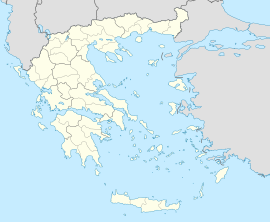Zagliveri (Greek: Ζαγκλιβέρι) is a village and a community of the Lagkadas municipality.[2] Before the 2011 local government reform it was part of the municipality of Kallindoia, of which it was a municipal district and the seat.[2] The 2021 census recorded 1,774 inhabitants in the village.[1] The community of Zagliveri covers an area of 63.224 km2.[3]
Zagliveri
Ζαγκλιβέρι | |
|---|---|
| Coordinates: 40°34.3′N 23°17.3′E / 40.5717°N 23.2883°E | |
| Country | Greece |
| Administrative region | Central Macedonia |
| Regional unit | Thessaloniki |
| Municipality | Lagkadas |
| Municipal unit | Kallindoia |
| Area | |
• Community | 63.224 km2 (24.411 sq mi) |
| Elevation | 205 m (673 ft) |
| Population (2021)[1] | |
• Community | 1,774 |
| • Density | 28/km2 (73/sq mi) |
| Time zone | UTC+2 (EET) |
| • Summer (DST) | UTC+3 (EEST) |
| Postal code | 570 12 |
| Area code(s) | +30-2393 |
| Vehicle registration | NA to NX |
According to the statistics of Vasil Kanchov ("Macedonia, Ethnography and Statistics"), 900 Greek Christians and 260 Turks lived in the village in 1900.[4]
In October 1913, Albanians from Mandritsa (Μανδρίτσα) settled in the village, following a Bulgarian invasion in their home village.[5]
See also
editReferences
edit- ^ a b "Αποτελέσματα Απογραφής Πληθυσμού - Κατοικιών 2021, Μόνιμος Πληθυσμός κατά οικισμό" [Results of the 2021 Population - Housing Census, Permanent population by settlement] (in Greek). Hellenic Statistical Authority. 29 March 2024.
- ^ a b "ΦΕΚ B 1292/2010, Kallikratis reform municipalities" (in Greek). Government Gazette.
- ^ "Population & housing census 2001 (incl. area and average elevation)" (PDF) (in Greek). National Statistical Service of Greece.
- ^ Kanchov, Vasil, Macedonia, Ethnography and Statistics, Sofia, 1900, book 2, p. 11. Written as "Загливеръ". (in Bulgarian)
- ^ Kotsoglou, Despina (2018). «Τα δημογραφικά και κοινωνικά χαρακτηριστικά των Αρβανιτών της Θράκης. Democritus University of Thrace. p. 16.
Τα αρβανιτοχώρια, κατά την διάρκεια των Βαλκανικών πολέμων, λεηλατήθηκαν και οι κάτοικοι τους εξορίστηκαν, ενώ πολλοί δολοφονήθηκαν. Τον Οκτώβριο του 1913, η Μανδρίτσα, λεηλατήθηκε από τους Βούλγαρους και οι κάτοικοι της κατέφυγαν στη Θράκη (στα χωριά Παλιούρι, Λάδη, Μεταξάδες και Βρυσικά) και στη Μακεδονία: στις Σέρρες, στη Σουρωτή, στο Ζαγκλιβέρι, στη Μουσθένη, στη Κάριανη Καβάλας και στον Καλό Αγρό Δράμας. Το μεγαλύτερο μέρος όμως των Μανδριτσιωτών, κατέληξε στο Αμπάρκιοϊ στο Κιλκίς το οποίο μετονομάστηκε σε Μάνδρες.
